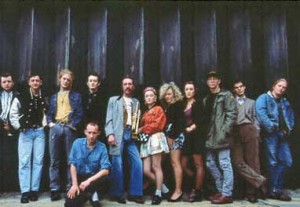The Commitments
Released: 1991
Genre: Comedy
Synopsis: They’re out of work. They live in Dublin’s working-class Northside neighborhood. They have negligible musical ability. And they’re Irish, of course. Naturally, they want to start an American-style Motown band, complete with Funk Brothers horn section and babelicious backup singers.
Initially, this loopy premise made sense only in the mind of author Roddy Doyle, who self-published his rollicking book “The Commitments” in 1987. In very short order, the idea went on to make sense to Doyle’s wildly enthusiastic audience.
Of course, to Doyle’s creation Jimmy Rabbitte, Jr.—the young, charismatic manager of The Commitments—it made perfect sense that a group of Dubs would want to play American soul music. After all, as Jimmy put it in his irresistable recruiting pitch to potential band members: “The Irish are the blacks of Europe. And Dubliners are the blacks of Ireland. And the Northside Dubliners are the blacks of Dublin. So say it once, say it loud: I’m black and I’m proud.”
The lads (and the trio of “young wans” recruited to provide backup vocals and occasionally flash some leg) turn out to be blessed with talent. Guided by an old fella—horn player Joey “the Lips” Fagin, who claims to have backed up James Brown and most of the Motown masters—they live up to Jimmy’s expectations and quickly become Dublin’s “Saviours of Soul.” They’re a huge hit.
They are also disastrously dysfunctional.
Joey the Lips—a 40-ish, goggle-eyed, Jesus freak with a scraggly pony tail and bad teeth, and who still lives with his mother—quickly and unexpectedly claims the title of the band’s rakish Paddy. One by one, he woos the girls, sowing the seeds of jealousy and leaving the boys to puzzle over his mysterious appeal. But the source of most of the friction within the band is the lead singer Deco, who is blessed with a the perfect white soul voice—like a young Joe Cocker—and cursed with a toxic personality. Everyone in the band hates him—drummer Billy “The Animal” Mooney, most of all. Billy, who has already done time for assault, promises to kill him. (That is, when he’s not promising to assault Deco with a drumstick in a way that requires Vaseline.) For his part, Deco alternately hits on the girls in predictably seamy ways and despises them any time they get the chance to step out of his shadow.
Through it all, Jimmy sees The Commitments as the “band of destiny.” Sure, but destined for what? Will they a.) land that contract with the fella Dave from Eejit Records? Or b.) will they implode first? (If you don’t want to know, skip the rest.)
Why it’s one of the best: First off, it’s not just me who says so. Back in 2005, the good people who make Jameson’s Irish Whiskey (you may all bow your heads), together with The Dubliner Magazine, named “The Commitments” the best Irish movie of all time, based on votes from more than 10,000 movie fans.
And 10,000 rabid movie-goers can’t be wrong.
Alan Parker manages to capture all the grit and poverty of Doyle’s Northside, while at the same time revealing the brutal, profane honesty and desperate passion of the kids who form the band. He draws perfect, spot-on performances from his cast of unknowns.
And the music—well, The Commitments aren’t exactly the Funk Brothers, but they’ll do nicely in a pinch. What they lack in experience, they more than make up for in enthusiasm. These kids rock.
And, although The Commitments fall apart in spectacular fashion at the end, it’s hard to feel too disappointed. Because, regardless of the outcome, The Commitments is about the power of hope.
Jimmy Rabbitte, predictably, is crushed and angry when his dreams for The Commitments evaporate along with the band. But Joey the Lips sets him straight:
“You’re missin’ the point. The success of the band was irrelevant—you raised their expectations of life, you lifted their horizons. Sure, we could have been famous and made albums and stuff, but that would have been predictable. This way, it’s poetry.”
And it is.
P.S. for Parents: Massive F-bomb alert.




